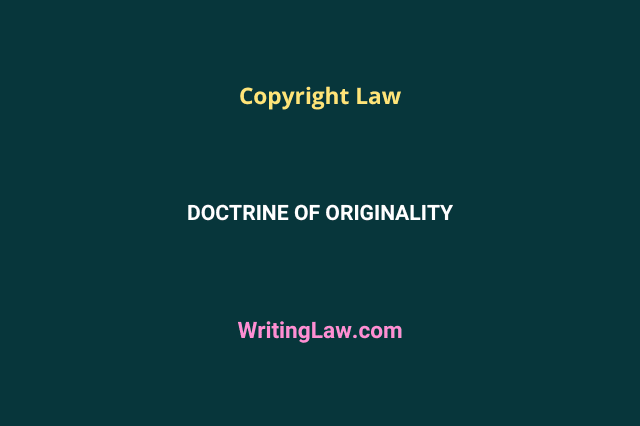
The first criterion for determining whether to award copyright protection to a piece of work is believed to be originality. The Indian Copyright Act of 1957 does not define the term “originality,” and section 13(1) of that law only specifies that copyright applies to “original literary, dramatic, musical, and artistic works.”
Therefore, originality may be summed up as an author’s intellectual work. The level of originality necessary for a work to receive copyright protection can now be decided by the court because the Act does not include a test for originality.
This article will explain the concept of originality and three different doctrines used by various countries to determine the originality of a work.
Sweat of the Brow Doctrine in the UK
This concept states that any author who can demonstrate basic diligence throughout the development of the work will be given copyright protection. According to this doctrine, copyright protection will be given to any work where an author’s skills and labour have been utilised.
The demand for creativity, which should be present in production in addition to skill and effort, is not required by this doctrine.
This approach was initially applied in the 1990 case of Walter vs Lane, which concerned the publication of an oral address in a newspaper article. The main argument is whether verbatim copying of the speech would be regarded as a copyright violation.
The court decided to give the piece of work copyright protection. In essence, the court found that verbatim copies of the speech were protected by copyright.
The Chancery Division of England explained the “originality test,” sometimes known as the “sweat of the brow” concept, in the case of the University of London Press vs University Tutorial Press.
The court ruled that the expression of a work does not have to be wholly unique or innovative for the Copyright Act to apply. However, it demands that the work be original to the creator and not a copy of something else.
In the case of question papers, they are considered original under copyright laws as they come from their authors. The court emphasised that copyright protection should not be denied to the plaintiff solely because other examiners have asked similar questions.
This doctrine is also recognised and followed in other jurisdictions such as Canada, Australia, and India.
Modicum of Creativity Doctrine in the USA
The oldest and most advanced copyright regulations are found in the USA. The subjective and creative contributions of the writers have both been accorded equal weight by the courts.
The US Supreme Court ruled in the case of Feist Publications, Inc. vs Rural Telephone Service Co. that a work must display some degree of creativity to qualify for copyright protection and be a product of independent creation.
According to this doctrine, work will only include uniqueness if at least a substantial amount of creativity is used in its formation. Although the level of creativity need not be extremely high, it must demonstrate a minimal level of creativeness to be protected by copyright.
The main issue raised in the case mentioned above is whether a collection, like a phone book, may be given copyright protection. The court ruled that although collections of information may be protected by copyright, individual facts, such as names and addresses, cannot.
The collection is copyrightable principally because of the original expression provided by the arrangement and the existence of at least some degree of originality.
In this instance, the court concluded that Rural’s directory lacked the essential degree of creativity for copyright protection. The directory lacked even the bare minimum of innovation required for copyright protection. As a result, Rural’s case was dismissed.
Doctrine of Merger in India
India adhered to the “sweat of the brow” concept for a long period. Still, following the Eastern Book Company & Ors vs D.B. Modak & Anr decision, the Supreme Court abandoned the doctrine. It adopted the “modicum of creativity” strategy used by the US.
In this case (Eastern Book Company & Ors vs D.B. Modak & Anr), the court introduced the idea of a “flavour of a minimum requirement of creativity.” The judgment clarified that the revisions and contributions made by the editors of SCC Online (Supreme Court Cases) to the legal rulings were protected by copyright.
Conclusion
In conclusion, the theory of originality is vital in assessing whether a work qualifies for copyright protection. There is a widespread notion that uniqueness involves more than effort or labour, even if many countries have chosen different approaches and no consistent idea is followed.
The “sweat of the brow” philosophy, which is upheld in the UK and other countries, emphasises the use of skill and labour in a piece of work without necessarily needing a high degree of creativity.
However, a work must exhibit at least a minimal level of intellectual innovation to qualify for copyright protection under the “modicum of creativity” concept, followed in the US and India.
Eastern Book Company & Ors vs D.B. Modak & Anr case, which demonstrated the transition from the “sweat of the brow” theory to the “modicum of creativity” approach in India, shows the importance of creative expression in giving copyright protection. Even though some elements of a work, such as court rulings, may be in the public domain, the Supreme Court’s ruling, in this case, recognised that editors’ modifications and contributions might have the necessary level of creativeness to warrant copyright protection.
In the end, determining originality under copyright law is frequently arbitrary and based on each case’s particular facts and circumstances. Courts must balance ensuring that creative expression is adequately protected and preventing copyright from unnecessarily limiting access to knowledge and information already in the public domain.
Read Next:
- What Is Misappropriation of Trade Secrets and Its Defences? - 15th May 2024
- 7 Important Types of Mediation Briefly Defined - 14th May 2024
- Whirlpool India vs Videocon Industries – Case Explained - 13th May 2024







